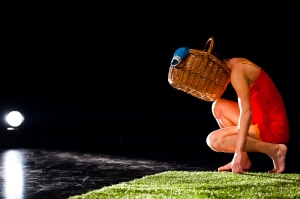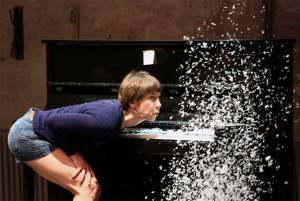
When José Laginha, from Capa/Devir (a cultural structure in the sunny south coast of Portugal) introduced us to modul-dance network we knew very little of it, except that some other Portuguese choreographers (Tânia Carvalho and Cláudia Dias) had also been supported by it in the previous editions.
The meeting in Barcelona, in November 2012, was the first moment we got to grasp the dimension of this network. It was surprising to see the variety of artists, programmers and their specific projects/contexts of action. Although big in scale, the meeting seemed to have the right balance of formality and informality for an actual exchange to happen, and we were caught by its intensity and the way everyone was focused to make it significant and useful.
In that meeting we found affinities with a group of four partners that hosted our project - Satellites - in several residencies over the year. They were Arts Station Foundation, Dance Ireland, Duncan Dance Centre and El Graner. Each place had its own atmosphere and each had inevitably a very specific influence in the way we approached our research. It’s intriguing to notice that no matter how concrete and precise your artistic research is, the characteristics of the studio, its temperature, its privacy, the place where you sleep, the food, the streets you pass by, the familiarity or not with the language, the people you interact with and many other details will work on your research stretching it into unpredictable morphologies.
One can almost draw a big circle in a map connecting those four structures we have collaborated with, starting in Dublin, drawing a soft curve until Poznań, then down to Athens and from there making our way up again to Barcelona. Curiously, like Lisbon, all of these cities make part of some kind of geographical periphery. Not to force a geopolitical layer to this coincidence, but there is something quite interesting in our orbit through this constellation of countries that have a lot of similarities in their recent social and economical histories; specially when one of the main axis of our research in Satellites is about the tension between centre and periphery and the atomization of the centre.
Satellites' first residency was in Poznań and it was marked by a particular research on movement and voice. The residency happened in the same space we had presented one of our works, in the context of Malta Festival, half a year before. It makes a lot of sense when there’s continuity in the relation between artists and partners, and modul-dance just made this possible. As it usually happens, the first residency is where we end up doing everything we had previously thought about the project, as if to take those first preconceived ideas out of the way so that other things coming from the experience of doing may emerge. Not to forget the open class we were invited to give to a vigorous and enthusiastic local community.
Then, in Dublin, we've continued the research ending with an informal open-doors rehearsal where we could share some of the embryonic material with a few spectators and discuss the concepts that were being set as a basis for the work. Work-in-progress showings are something that we tend to avoid; yet, the thing that made sense wasn't exactly what we shared but that it served as a pretext for dialogue. We had also the opportunity to discover and be inspired by Casement’s complex and wonderful life (thanks Paul, for The Black Diaries).
In Athens, we've worked for a week mainly on sound and text, using the surroundings to capture different sounds and test a few ideas about the interaction of the body with the space mediated by a recorded voice. It's impossible not to visit the city and be completely drawn into one of he world's oldest cities, especially when the person who's hosting you is such a passionate guide. In the following week we presented a piece of ours in Arc for dance Festival that had a small focus on modul-dance artists.
Finally, in Barcelona we where able to invite two collaborators of our project, and share some of the ideas that we had been exploring previously, testing them with other bodies and amplifying their possibilities. In El Graner, the term residency was accurately employed because we would sleep and work in the same building. Other artists were also developing their own projects and the fact that we shared a physical space together fostered a genuine curiosity for each other's works.
Now that modul-dance's edition is coming to an end we feel privileged to having been part of it. It is clear that it isn't just about the time you spend in the network, or the obvious benefits of being supported by it; but it's also about encouraging dialogue and setting out grounds for future collaborations.
Picture: © Sofia Dias & Vítor Roriz





